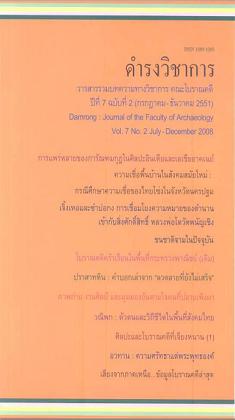FOLK BELIEFS IN MODERN THAI SOCIETY: A CASE STUDY OF THE SONG EHINIC GROUP, IN NAKHON PATHOM PROVINCE
Keywords:
ความเชื่อพื้นบ้าน, ไทยโซ่ง, การอนุรักษ์ชุมชนAbstract
Situation:Nowadays there are rapid changes taking place in many areas of life including; the economy, society, culture, the environment and natural resource exploitation. These changes also affect an often neglected area – ethnic groups and their traditional wisdoms. Sadly, the movement away from the beliefs, traditions and ceremonies of these ethnic groups is often overlooked. This case study focuses on this area and tries to answer such questions as; What are the characteristics of the Song (ethnic group) folk beliefs in modern Thai society? What frames these characteristics? How can we preserve, restore and develop these characteristics? How can we preserve, restore and develop these characteristics in order to improve our quality of life in this historic time of great change?
Findings : This study found that regarding fundamental factors for living; security, home, love, family bond, honor, happiness and success, most Song fully acceptand integrate modern science and technology along with their traditional beliefs to best benefit their daily lives. For example, they embrace the efficiency and helpfulness of modern machines that improve their daily rigmarole whilst simultaneously maintaining astrological superstitions and beliefs in the power of ancestral ghosts. Another example of this balance is the acceptance of modern medicine and health care along with the use of their traditional healing methods. The Song holdthe strong belief that money is power and can fulfill our desires, but manage to retain principles of merit, charity and goodness – what you sow in this lifetime you will reap in the next is an example of the Song beliefsin natural righteousness and balance.
Presently these beliefs are not formalized with a central doctrine; rather they are maintained at individual and family level. This may be due, in part, to the Song people’s current context of their integration and reliance on modern society rather than complete ethnic independence – healthcare and consumer products are examples. Nonetheless, the author suggests that the Song should be encouragedto study their traditions in depth and use this knowledge as a tool for improving their quality of life, sustaining Song institutions and holding back modernization.
Recommendations: Social development agencies and organizations should encourage the Song to collaboratively conduct studies into Song beliefs and traditions, concentrating follow-up research upon key findings. Furthermore, this process of research into themselves could help them to realize the importance of these beliefs and traditions, strengthening and preserving their long term sustainability.
References
เรณู เหมือนจันทร์เชย. (2541), การศึกษาอิทธิพลของความเชื่อ ประเพณี และพิธีกรรมของไทยโซ่งที่มีผลต่อการพัฒนาคุณภาพชีวิต: กรณีศึกษาบ้าน แหลมกะเจา ๒ ตําบลลําลูกบัว อําเภอดอนตูม จังหวัดนครปฐม. หลักสูตร ศิลปศาสตรมหาบัณฑิต สาขาวิชาพัฒนาชนบทศึกษา บัณฑิตวิทยาลัย มหาวิทยาลัยมหิดล
เรณู เหมือนจันทร์เชย. (2542). โลกทัศน์ของกลุ่มชาติพันธุ์ในประเทศไทย : ความเชื่อเรื่องผีของไทยโซ่ง, สถาบันวิจัยภาษาและวัฒนธรรมเพื่อ พัฒนาชนบท, กรุงเทพฯ: บริษัท สหธรรมิก จํากัด
เรณู เหมือนจันทร์เชย. (2545-2546). โลกทัศน์ของกลุ่มชาติพันธุ์ในประเทศ ไทย : นิทานไทยโซ่ง. สถาบันวิจัยภาษาและวัฒนธรรมเพื่อพัฒนาชนบท กรุงเทพฯ : บริษัท สหธรรมิก จํากัด.
เรณู เหมือนจันทร์เชย. (2550). การเปลี่ยนแปลงทางสังคมและวัฒนธรรมของ ไทยโซ่งบ้านเกาะแรต ตําบลบางปลา อําเภอบางเลน จังหวัดนครปฐม. สถาบันวิจัยภาษาและวัฒนธรรมเพื่อพัฒนาชนบท มหาวิทยาลัยมหิดล.
สมทรง บุรุษพัฒน์. (2540), สารานุกรมกลุ่มชาติพันธุ์ในประเทศไทย: ไทยทรงดํา, สถาบันวิจัยภาษาและวัฒนธรรมเพื่อพัฒนาชนบท มหาวิทยาลัยมหิดล.
Downloads
Issue
Section
License
บทความนี้เป็นผลงานของข้าพเจ้าแต่เพียงผู้เดียว และ/หรือเป็นผลงานของข้าพเจ้าและผู้ร่วมงาน ตามชื่อที่ระบุในบทความจริง และเป็นผลงานที่มิได้ถูกนำเสนอหรือตีพิมพ์ที่ใดมาก่อน





